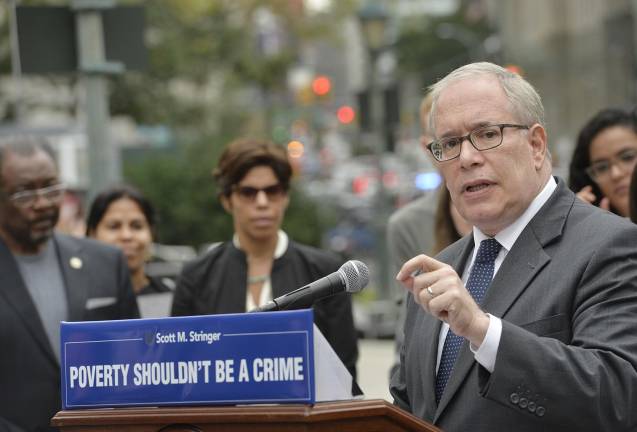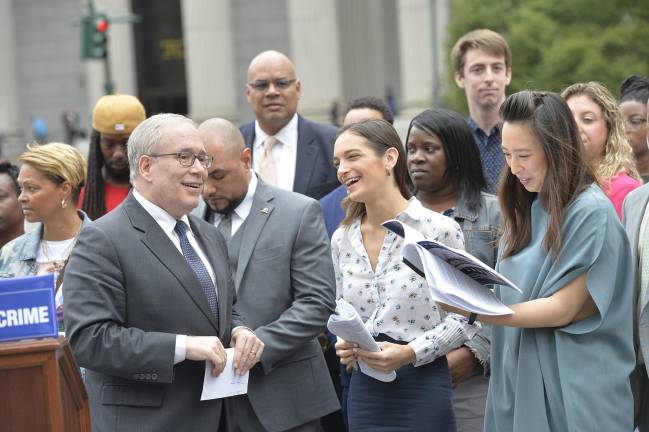The Costs of Criminal Justice
Comptroller Scott Stringer proposes lessening the financial burdens on former inmates


A week after the City Council’s hearing on closing Rikers, Comptroller Scott Stringer added a new element to the criminal justice debate.
As activists and city officials push for a focus on rehabilitation, Stringer is proposing a policy that he says will help break the cycle of re-incarceration - and relieve former inmates of undue financial burdens.
In 2017, formerly incarcerated people took on a debt of $20 million in court fees and mandatory surcharges upon leaving lockup, with some doing more time after failing to pay the fines, according to a report Stringer released last week.
The report shows that about 45 percent of state parolees are leaving prison with outstanding court debt. In 2017, the courts issued more than 10,000 civil judgments and 11,000 warrants for failing to pay criminal court debt.
Stringer, who is contemplating a run for the mayor’s office in 2021, said these charges largely impact communities of color and low-income New Yorkers by harming their financial records, interfering with job opportunities and keeping them trapped within the prison system.
“Even the most minor encounters with the criminal justice system can come with a hefty price tag — and eventually lead to dire consequences for New Yorkers, their families and friends,” Stringer said in a statement. “For too many New Yorkers, our criminal justice system foments an unrelenting cycle of poverty and punishment. It’s time for fundamental, transformational change.”
Fines and Service Fees
These mandatory surcharges can be imposed upon sentencing and can run as high as $375. In addition to these surcharges, according to the report, fees are tacked onto a person’s debt throughout their time in jail and through parole and probation. In 2018, families and friends of inmates paid $2 million in service fees to transfer money to those inmate’s accounts. Inmates are also subject to 15 different fines if they want to withdraw any additional funds left in their jail accounts, including a $9.95 card account closure fee.
Upon release, parolees are expected to pay a monthly $30 supervision fee, and, according to the report, the private companies that collect these fees charge their own “convenience fee” of $2 or $3 per each money transfer.
To put an end to what Stringer calls “the criminalization of poverty” within New York’s justice system, he is calling for reforms that would eliminate mandatory surcharges, forgive outstanding court debt, end driver’s license suspension for unpaid fees, end parolee and probation supervision fees and end the practice of incarceration for unpaid fees.
“These costs aren’t just an issue of dollars and cents — they’re an issue of right and wrong,” Stringer said. “We have to go beyond bail reform to full untangle the system of punitive property which fuels our mass incarceration system. Any comprehensive agenda to decarcerate New York City must dismantle the cycle of onerous fees and surcharges that keep New Yorkers, their families, and communities locked up in a spiral of debt.”
"Perpetuating Racial Bias"
Among those in support of Stringer’s proposal is Victor Herrera, a leader of the #CLOSERikers campaign with JustLeadershipUSA.
“It is obvious that any mandatory surcharges attached to court procedures target and criminalize poverty and focus on raising money for more broken windows policing and keeping our communities oppressed,” Herrera said in a statement. “The State and local budgets should not be built on such fines and fees for revenue. This must end!”
Assembly member Yuh-Line Niou, who represents the 65th District, has given her support to the policy, saying the current system is “deeply flawed, perpetuating racial bias, and predominantly affecting our communities of color.”
“Mandatory surcharges and fees are another flaw in our system and do not advance our criminal justice system in a meaningful way,” Niou said in a statement. “These regressive taxes disproportionately affect the individuals who are least able to pay. We need to work towards a more equitable criminal justice system and that starts with eliminating these fees and surcharges.”
Stringer has called on the de Blasio administration to help lobby legislators in Albany to make ending surcharges the next step in reforming the state and city’s justice system.
““Even the most minor encounters with the criminal justice system can come with a hefty price tag — and eventually lead to dire consequences for New Yorkers, their families and friends.” Comptroller Scott Stringer